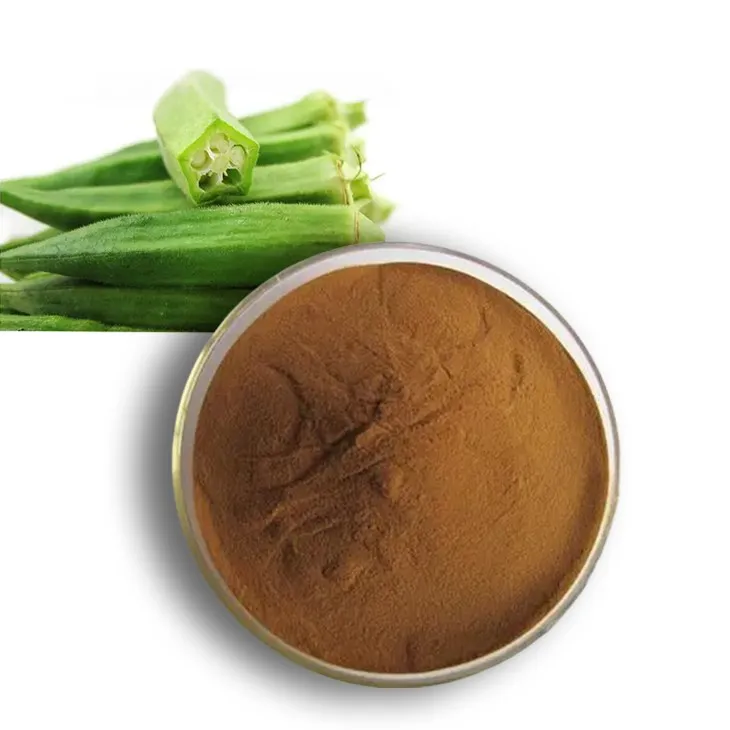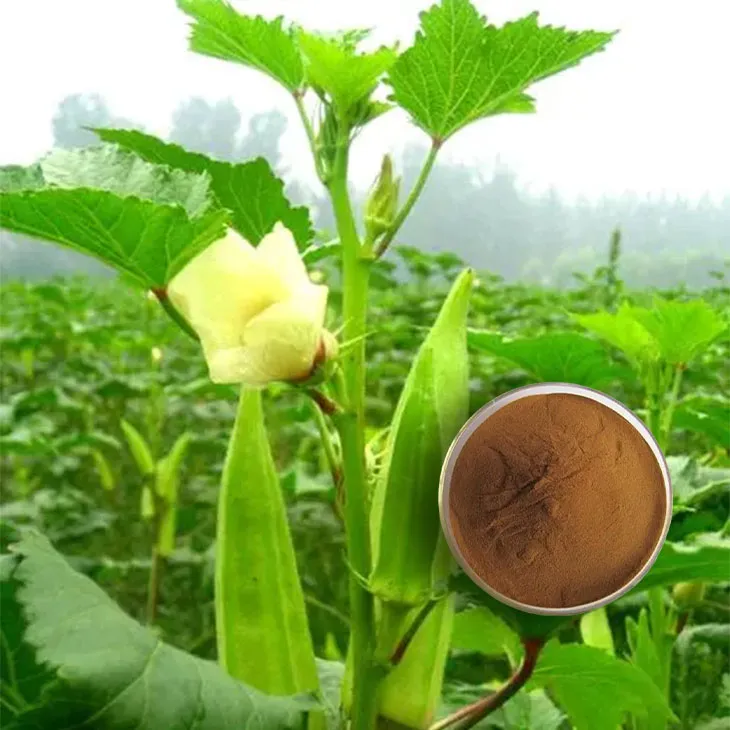- 0086-571-85302990
- sales@greenskybio.com
Optimal Bioavailability of Okra Extract.
2024-12-02

1. Introduction
Okra, a popular vegetable in many parts of the world, has been recognized for its potential health benefits. Okra Extract, which contains a rich array of bioactive compounds, has drawn increasing attention in the field of nutrition and health. However, the bioavailability of these compounds in Okra Extract is a crucial factor that determines their effectiveness in promoting health. Bioavailability refers to the proportion of a substance that enters the circulation and is thus available at the site of action. Understanding how to maximize the bioavailability of Okra Extract is essential for harnessing its full potential in improving health outcomes.

2. Chemical Composition of Okra Extract
Okra extract is composed of a variety of chemical components, each with its own unique properties and potential health benefits.
2.1. Polysaccharides
Okra is rich in polysaccharides, such as mucilage. These polysaccharides are long chains of sugar molecules. Mucilage in okra has been shown to have various health - promoting effects, including potential benefits for digestive health. It can act as a prebiotic, promoting the growth of beneficial gut bacteria.
2.2. Flavonoids
Flavonoids are another important class of compounds in okra extract. They are known for their antioxidant properties. Antioxidants help to protect the body against oxidative stress, which is associated with various diseases such as cancer, heart disease, and neurodegenerative disorders. Examples of flavonoids in okra include Quercetin and kaempferol.
2.3. Vitamins and Minerals
Okra contains vitamins such as vitamin C, vitamin K, and folate. Vitamin C is an antioxidant that also plays a role in collagen synthesis. Vitamin K is important for blood clotting and bone health. Folate is essential for cell division and DNA synthesis. In addition, okra contains minerals like potassium, magnesium, and calcium, which are involved in various physiological functions such as nerve conduction, muscle contraction, and maintaining bone density.

3. Impact of Processing Techniques on Bioavailability
Different processing techniques can significantly affect the bioavailability of okra extract.
3.1. Drying
Drying is a common method for preserving okra. However, it can have both positive and negative impacts on bioavailability. Air - drying or sun - drying okra may cause some loss of water - soluble vitamins and volatile compounds. On the other hand, proper drying can concentrate certain bioactive compounds, potentially increasing their bioavailability. For example, the polysaccharides in okra may become more accessible after drying.
3.2. Cooking
Cooking okra can also influence its bioavailability. Boiling okra may cause some of the water - soluble nutrients to leach into the cooking water. However, cooking can also break down cell walls, making the bioactive compounds more accessible. For instance, cooking okra can increase the availability of flavonoids by disrupting the plant matrix. Stir - frying or steaming okra may be better options compared to boiling as they may preserve more of the nutrients.
3.3. Extraction Methods
The method used to extract okra extract can greatly affect its bioavailability. Solvent extraction, for example, can be used to isolate specific bioactive compounds. However, the choice of solvent is crucial. Organic solvents may be effective in extracting certain compounds but may also leave behind residues that could be harmful. Aqueous extraction, on the other hand, is a more natural and potentially safer method, but it may not be as efficient in extracting all the desired compounds. Enzyme - assisted extraction is another emerging technique that can improve the extraction yield and potentially enhance the bioavailability of the compounds in okra extract.

4. Practical Ways to Enhance Bioavailability
There are several practical approaches that can be taken to enhance the bioavailability of okra extract for better health outcomes.
4.1. Combining with Other Foods
Combining okra extract with certain foods can enhance its bioavailability. For example, consuming okra extract with foods rich in healthy fats, such as avocados or nuts, can improve the absorption of fat - soluble vitamins and flavonoids present in the okra extract. The fats can act as carriers, facilitating the transport of these compounds across the intestinal membrane. Additionally, combining okra with foods high in fiber, like whole grains, can slow down the digestion process, allowing more time for the absorption of the bioactive compounds in okra.
4.2. Formulation and Encapsulation
Formulating okra extract into supplements or encapsulating it can protect the bioactive compounds from degradation in the digestive tract and improve their bioavailability. Encapsulation can shield the compounds from factors such as stomach acid and digestive enzymes until they reach the appropriate site in the intestine for absorption. Microencapsulation techniques, in particular, can be used to create small particles that can be easily absorbed by the body.
4.3. Optimization of Dosage
Determining the optimal dosage of okra extract is crucial for maximizing its bioavailability. Too low a dosage may not provide sufficient amounts of the bioactive compounds to have a significant health effect, while too high a dosage may lead to potential toxicity or reduced absorption due to saturation of transport mechanisms. Research is needed to identify the appropriate dosage range for different health conditions and individuals.
5. Health Outcomes Associated with Maximized Bioavailability
When the bioavailability of okra extract is maximized, several positive health outcomes can be expected.
5.1. Digestive Health
The enhanced bioavailability of okra's polysaccharides can have a significant impact on digestive health. These polysaccharides can help regulate bowel movements, prevent constipation, and improve the overall function of the gut microbiota. By promoting the growth of beneficial bacteria, they can also enhance the gut's immune function and protect against intestinal infections.
5.2. Cardiovascular Health
The antioxidants and other bioactive compounds in okra extract, when optimally available, can contribute to cardiovascular health. Flavonoids can help reduce inflammation in the blood vessels, lower blood pressure, and improve lipid profiles by reducing LDL cholesterol levels and increasing HDL cholesterol levels. This can reduce the risk of heart disease and stroke.
5.3. Anti - Cancer Potential
The antioxidant and anti - inflammatory properties of okra extract, with enhanced bioavailability, may play a role in cancer prevention. Oxidative stress and chronic inflammation are associated with the development of cancer. By reducing these factors, okra extract may help prevent the initiation and progression of cancer cells. However, more research is needed to fully understand the anti - cancer mechanisms of okra extract.
6. Conclusion
Okra extract is a rich source of bioactive compounds with potential health benefits. Maximizing its bioavailability through appropriate processing techniques, combination with other foods, formulation, and optimization of dosage can lead to improved health outcomes. Understanding the chemical composition of okra extract and how different factors impact its bioavailability is essential for fully exploiting its health - promoting potential. Future research should focus on further exploring the mechanisms underlying bioavailability enhancement and conducting more clinical trials to confirm the health benefits associated with maximized bioavailability of okra extract.
FAQ:
What is the chemical composition of okra extract?
The okra extract contains various components. It has mucilage, which is a polysaccharide rich in galacturonic acid, rhamnose, and galactose. It also contains flavonoids like Quercetin, vitamins such as vitamin C, and minerals including potassium. These components play different roles in its potential health benefits and bioavailability.
How do different processing techniques affect the bioavailability of okra extract?
Some processing techniques can have both positive and negative impacts. For example, drying okra can concentrate its components, but if the temperature is too high during drying, it may degrade some heat - sensitive compounds, reducing bioavailability. On the other hand, extraction methods using solvents need to be carefully chosen. If a non - optimal solvent is used, it may not fully extract the bioactive compounds, thus affecting how well the body can absorb them.
What are the practical ways to enhance the body's uptake of okra extract?
One way is to combine okra extract with certain foods. For instance, consuming it with a source of healthy fats can enhance absorption as some of the bioactive compounds in okra extract are fat - soluble. Another way is to optimize the form of the extract. For example, turning it into a nano - emulsion can increase its surface area, which may improve the body's uptake. Additionally, proper storage conditions to prevent degradation of the extract can also contribute to better bioavailability.
Are there any side effects associated with increasing the bioavailability of okra extract?
While okra is generally considered safe, when enhancing its bioavailability, there could be potential concerns. For example, if the extraction process leaves behind residues of solvents or additives used to enhance uptake, these could potentially be harmful. Also, increasing the bioavailability of certain components may lead to an excessive intake of some substances, which could cause adverse effects in some individuals, especially those with pre - existing health conditions.
Can the bioavailability of okra extract be too high?
Yes, it can be. If the body absorbs too much of the okra extract too quickly or in excessive amounts due to extremely high bioavailability, it may cause an imbalance in the body's normal physiological functions. For example, an over - absorption of certain minerals in the extract could disrupt the body's mineral homeostasis.
Related literature
- Bioavailability of Bioactive Compounds from Okra: A Review"
- "Processing Effects on the Nutritional and Bioactive Properties of Okra"
- "Enhancing the Bioavailability of Plant - Based Extracts: The Case of Okra"
- ▶ Hesperidin
- ▶ citrus bioflavonoids
- ▶ plant extract
- ▶ lycopene
- ▶ Diosmin
- ▶ Grape seed extract
- ▶ Sea buckthorn Juice Powder
- ▶ Beetroot powder
- ▶ Hops Extract
- ▶ Artichoke Extract
- ▶ Reishi mushroom extract
- ▶ Astaxanthin
- ▶ Green Tea Extract
- ▶ Curcumin Extract
- ▶ Horse Chestnut Extract
- ▶ Other Problems
- ▶ Boswellia Serrata Extract
- ▶ Resveratrol Extract
- ▶ Marigold Extract
- ▶ Grape Leaf Extract
- ▶ blog3
- ▶ blog4
- ▶ blog5
-
The best lemon juice powder in nature.
2024-12-02
-
Organic Vitamin K2 Powder Suppliers
2024-12-02
-
Bulk purchase of L - tyrosine.
2024-12-02
-
Vitamin K2 Manufacturers
2024-12-02
-
100% Pure Natural Rutin.
2024-12-02
-
Chinese Citrus Bioflavonoid Suppliers.
2024-12-02
-
Agaricus Blazei Extract
2024-12-02
-
Dandelion Leaf Extract
2024-12-02
-
Citrus bioflavonoids
2024-12-02
-
Giant Knotweed Extract
2024-12-02
-
Grapefruit Seed Extract Powder
2024-12-02
-
Chaste Berry Extract
2024-12-02
-
Elderberry Extract
2024-12-02
-
melatonin extract
2024-12-02
-
Lemon Juice Powder
2024-12-02
-
Motherwort Extract
2024-12-02





















